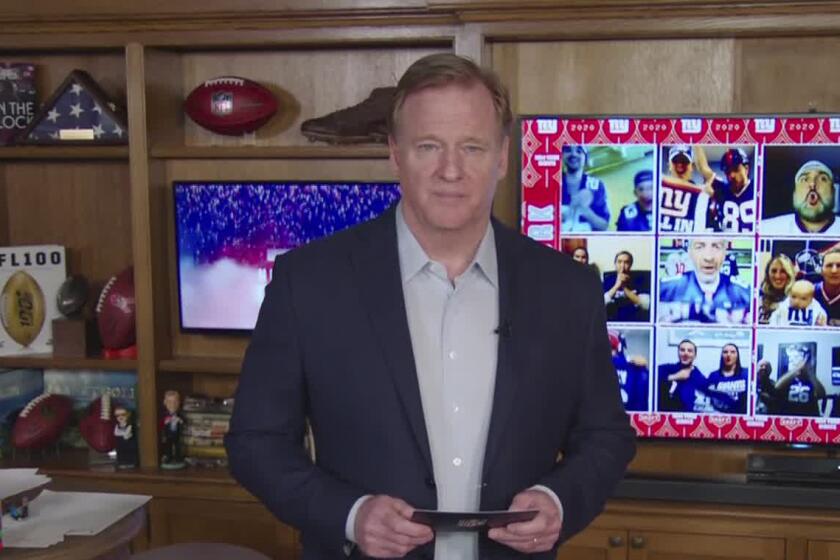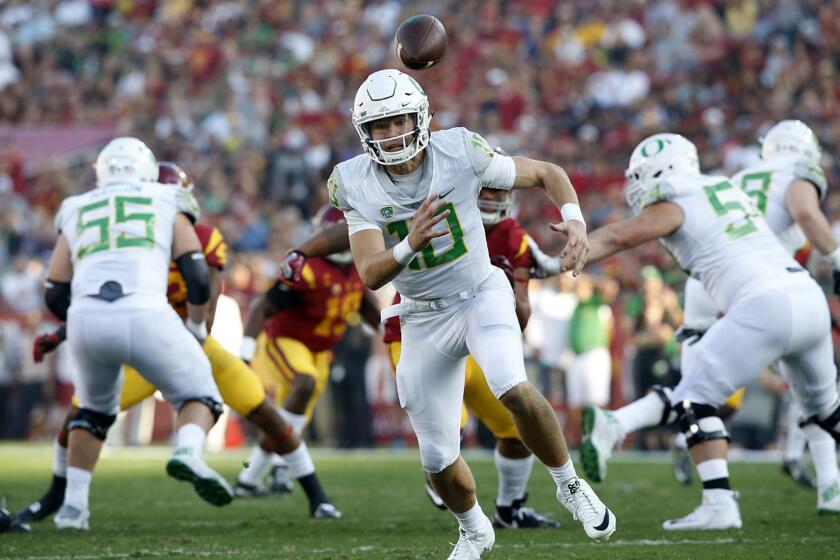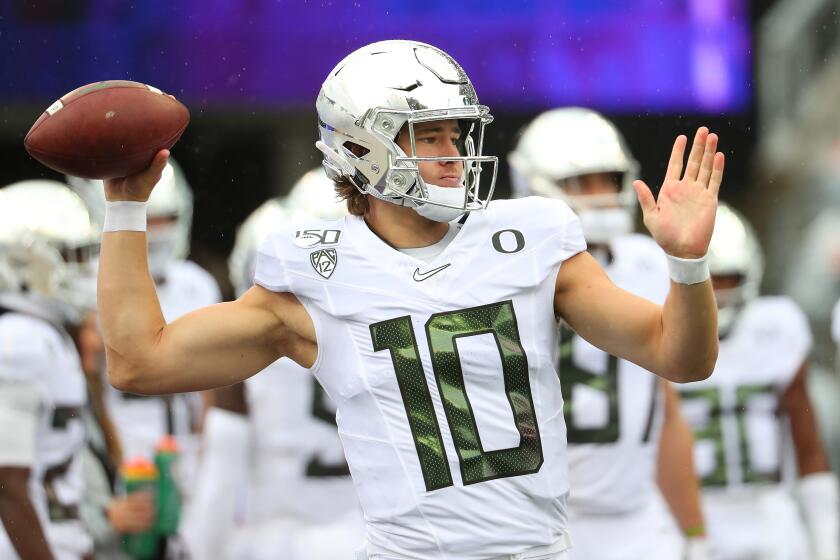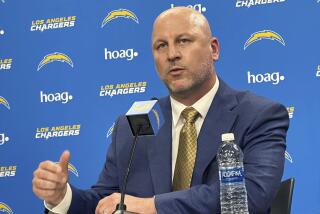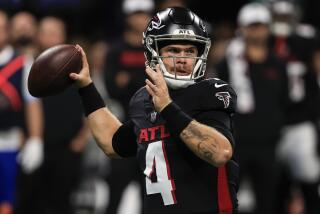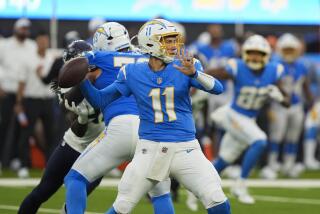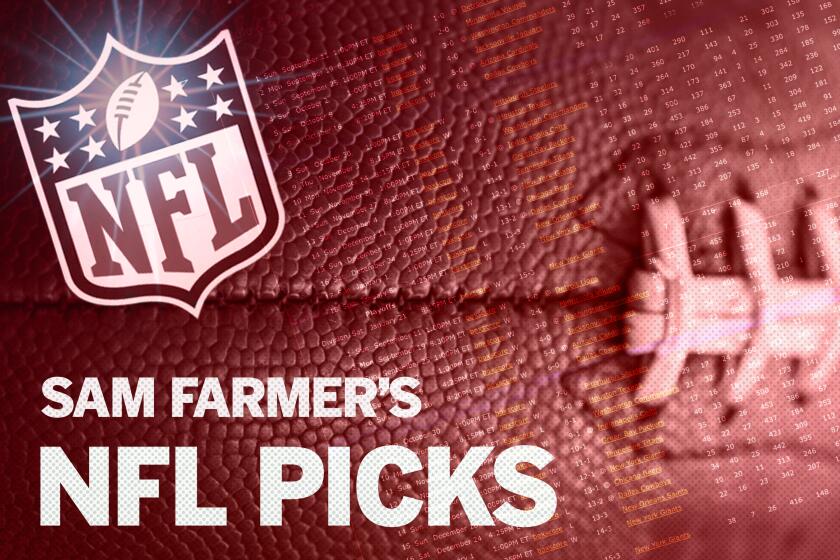More options for Chargers’ Herbert: UCLA back Joshua Kelley, Virginia receiver Joe Reed
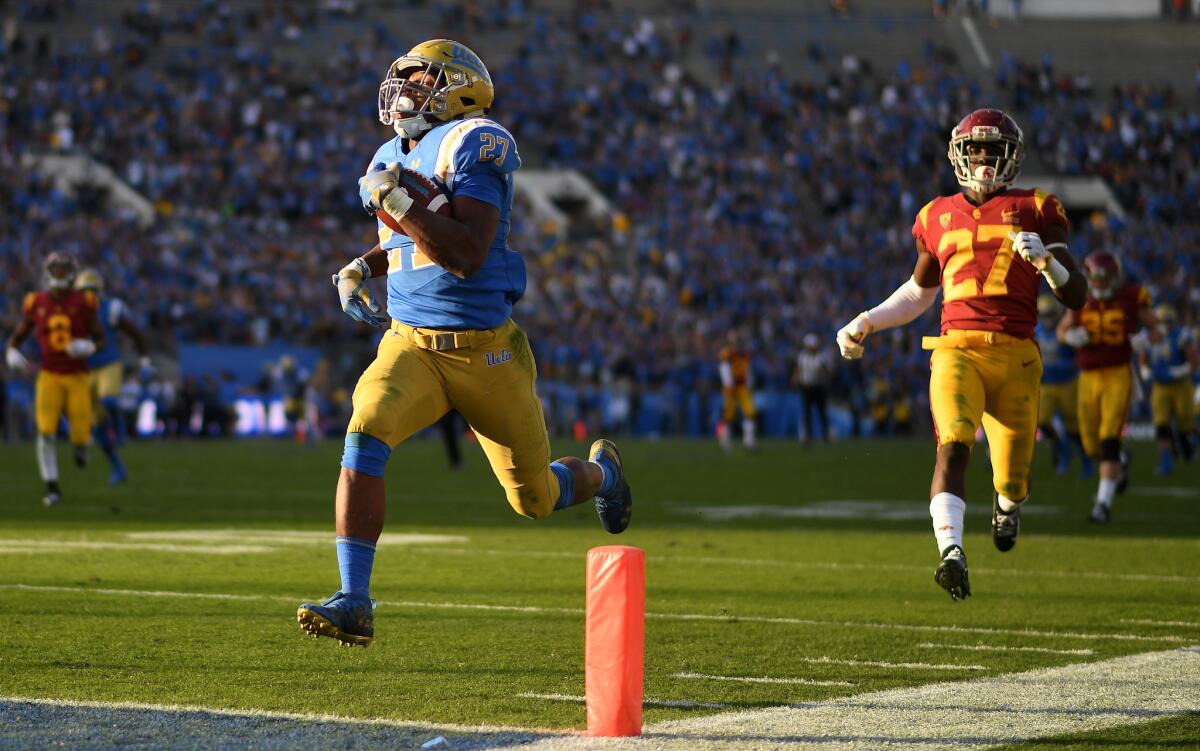
- Share via
The Chargers added six players in the NFL draft that concluded Saturday, six players they believe could eventually play roles of varying prominence.
But when a team takes a quarterback as high as No. 6 overall, as they did Thursday with Justin Herbert, the clock immediately starts to tick on when he’s going to play.
“We drafted him that high to one day be our franchise quarterback, for sure,” coach Anthony Lynn said. “But I don’t want to put a timetable on this young man. … Guys develop and they get ready at different times.
“Does he need a couple years? Does he need one year? Or maybe he doesn’t need any at all. I don’t know. They’re going to go in there and compete. The best guy’s going to play.”
For the record, the Chargers are expected to have veteran Tyrod Taylor as their starter to open next season. Particularly with an offseason program and perhaps training camp impacted by the COVID-19 pandemic, players entering the league are likely to have less time to prepare for their rookie year.
Commentary: The NFL’s first virtual draft was a big hit, so much so that the league must figure out how to blend its authentic style into future drafts.
All of which means Herbert will be groomed to succeed Taylor but with no exact plan for when he might be given a shot to take over the offense.
Along with learning a new system, Herbert also will be adjusting to playing under center, something he didn’t do at Oregon. Lynn even suggested the Chargers could use some pistol formation to help ease Herbert’s transition.
Regardless of how long the process takes, Lynn believes Herbert is the long-term answer at the most significant position in the game.
“What is there not to like about him?” Lynn said. “I think he answered every question and passed every test.”
After Herbert, the Chargers also drafted Kenneth Murray Jr. in the first round, at No. 23 overall. A “run-hit linebacker” — Lynn’s description — the former Oklahoma Sooner will bring an edge and speed to the defense.
On Saturday, the Chargers completed their draft by adding running back Joshua Kelley (fourth round, UCLA), wide receivers Joe Reed (fifth round, Virginia) and K.J. Hill (seventh round, Ohio State), and safety Alohi Gilman (sixth round, Notre Dame).
With the sixth pick in the 2020 NFL draft, the Chargers selected Justin Herbert. Or was he the one who selected them?
Born in Inglewood, Kelley was lightly recruited coming out of Eastside High in Lancaster and began his college career at UC Davis. After two years, he transferred to UCLA as a walk-on, eventually earning a scholarship and rushing for 2,303 yards and scoring 25 touchdowns the past two seasons.
Now, he’ll move on by not really moving much at all, Kelley able to extend his career with a team about to call SoFi Stadium its new home.
“I can’t really describe how I feel right now,” he said. “It’s almost like a dream come true, you know, get to play local, a place where I grew up. For me, that’s humbling.”
Before Saturday, the Chargers had only two running backs on their roster, Austin Ekeler and Justin Jackson. Kelley is expected to be given every opportunity to join them as the team looks to build depth at the position.
“I’m just very instinctual as a runner,” he said. “I have good vision. I run north and south and don’t waste time going east and west. I always fall forward. I have good ball security … I can do a lot of different things.”
Reed arrives as another possible weapon after a decorated and multi-faceted career at Virginia. He earned all-ACC honors last season as an all-purpose player and return specialist.
In the Cavaliers’ offense, he lined up all over, including in the backfield, something he said the Chargers already have talked to him about doing in the NFL.
“To me, he fits that role where you can have a package for this young man each and every week that can extend two or three drives or put points on the board,” Lynn said. “Defensive coordinators have to prepare for that stuff. We needed a multi-threat like that and I feel like he was the guy.”
In drafting Gilman, general manager Tom Telesco again dipped into the talent at Notre Dame. The Chargers’ roster already includes three former members of the Fighting Irish in Jerry Tillery, Isaac Rochell and Drue Tranquill.
Expected to be mostly a special teams contributor early on, Gilman called Tranquill “a big mentor for me.”
Justin Herbert is going from small town to big time in L.A. But to last, he and the Chargers are going to need to win, which is one thing he happens to be good at.
He also said he is good friends with former Chargers second-round pick and linebacker Manti Te’o. The two grew up in the same area of Laie, Hawaii, and talked Saturday.
At Notre Dame, Gilman said he played plenty of special teams, an area the Chargers are looking to bolster after losing Adrian Phillips, Derek Watt and Nick Dzubnar this offseason.
“I’m a very physical player,” said Gilman, who began his college career at Navy before transferring after one season. “Tackling is pretty natural for me. I feel really good doing it and that’s been a great strength of mine.”
Hill finished his college career as the all-time leader in receptions at Ohio State. He called himself a “route-technician” and said he has studied Keenan Allen, the Chargers’ No. 1 receiver.
“It’s kind of a coincidence …” Hill said. “I model my route-running after his. I feel like we have similar kinds of games in that area.”
The Chargers signed the following undrafted free agents Saturday: Asmar Bilal (linebacker, Notre Dame), Darius Bradwell (running back, Tulane), John Brannon (cornerback, Western Carolina), Cole Christiansen (linebacker, Army), Jeff Cotton (wide receiver, Idaho), Joshua Dunlop (guard, Texas-San Antonio), Breiden Fehoko (defensive tackle, Louisiana State), Romeo Finley (linebacker, Miami), Joe Gaziano (defensive end, Northwestern), Nate Gilliam (guard, Wake Forest), Bobby Holly (fullback, Louisiana Tech), Jessie Lemonier (defensive lineman, Liberty), Kevin McGill (cornerback, Eastern Michigan), Gabe Nabers (fullback, Florida State), Jared Rice (tight end, Fresno State), Ryan Roberts (offensive tackle, Florida State), Dalton Schoen (wide receiver, Kansas State), T.J. Smith (defensive tackle, Arkansas) and Donte Vaughn (cornerback, Notre Dame).
Joshua Kelley, running back
5 feet 11, 212 pounds, UCLA, Round 4, Pick 112
Notable: Kelley was a late bloomer in high school and had one scholarship offer, from UC Davis. After two years, he transferred to UCLA and played his final two seasons in Westwood.
Last season: A second-team all-Pac 12 pick, Kelley carried 229 times for 1,060 yards and 12 touchdowns.
Why Chargers drafted him: Before this pick, the Chargers had only two running backs on their roster — Austin Ekeler and Justin Jackson. Kelley gives the team added depth at a position of need and will be given a chance to work his way into the rotation.
Joe Reed, wide receiver
6 feet, 224 pounds, Virginia, Round 5, Pick 151
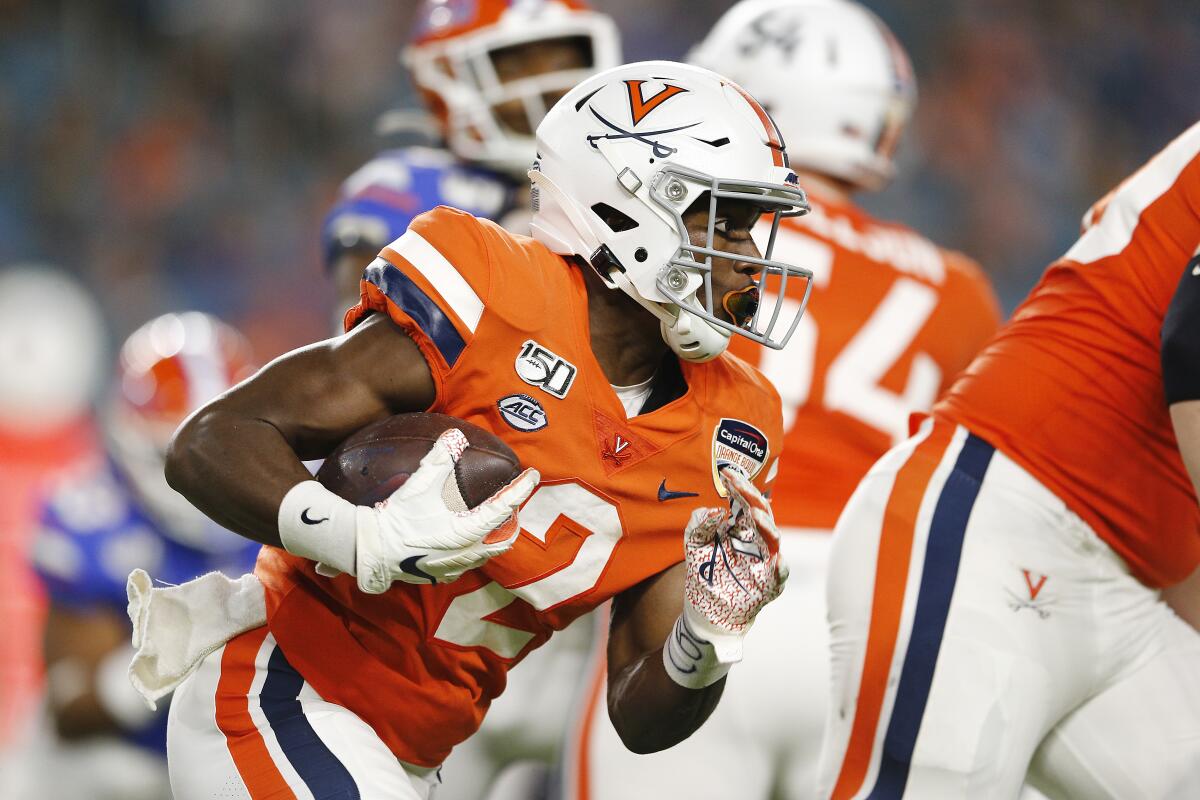
Notable: After running for 2,100 yards and scoring 38 touchdowns as a senior running back in high school in Virginia, Reed developed as a receiver and kick returner in college.
Last season: He was named first-team All-ACC as an all-purpose player and return specialist. Reed led Virginia in receptions, with 77 for 679 yards, and scored twice on kickoff returns, averaging 33.2 yards.
Why Chargers drafted him: After Keenan Allen and Mike Williams, the Chargers had a glaring gap at receiver. Dontrelle Inman was their best third wide receiver last season and he appeared in only four games. Reed also can fill a need at kickoff returner.
Alohi Gilman, safety
5 feet 10, 201 pounds, Notre Dame, Round 6, Pick 186
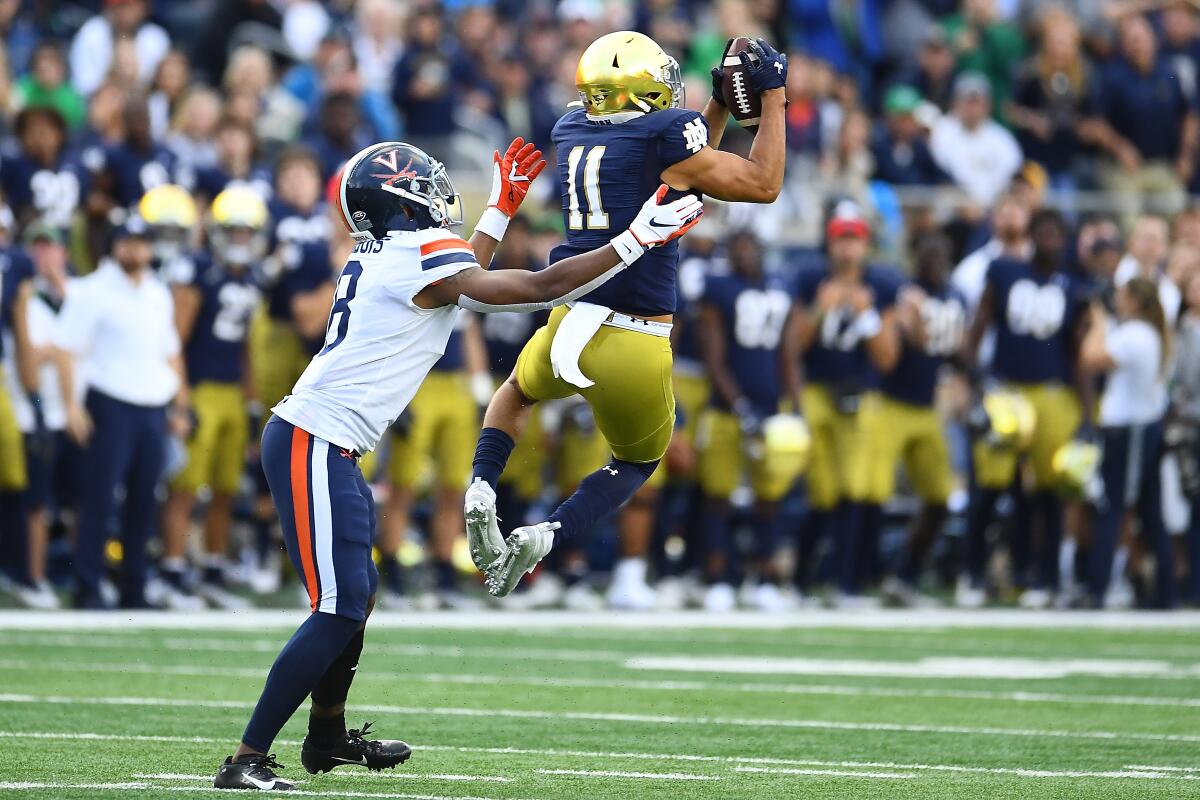
Notable: As a freshman in 2016, Gilman started 12 games for Navy and was second on the team with 76 tackles. He then transferred to Notre Dame.
Last season: Starting all 13 games for the Irish, he finished fourth on the team with 74 tackles. Gilman also had a sack, an interception and three forced fumbles.
Why Chargers drafted him: The Chargers have lost several of their most prominent special teams players this offseason. Gilman could fill that role. He joins a roster that already includes Notre Dame products Drue Tranquill, Jerry Tillery and Isaac Rochell.
K.J. Hill, wide receiver
6 feet, 196 pounds, Ohio State, Round 7, Pick 220
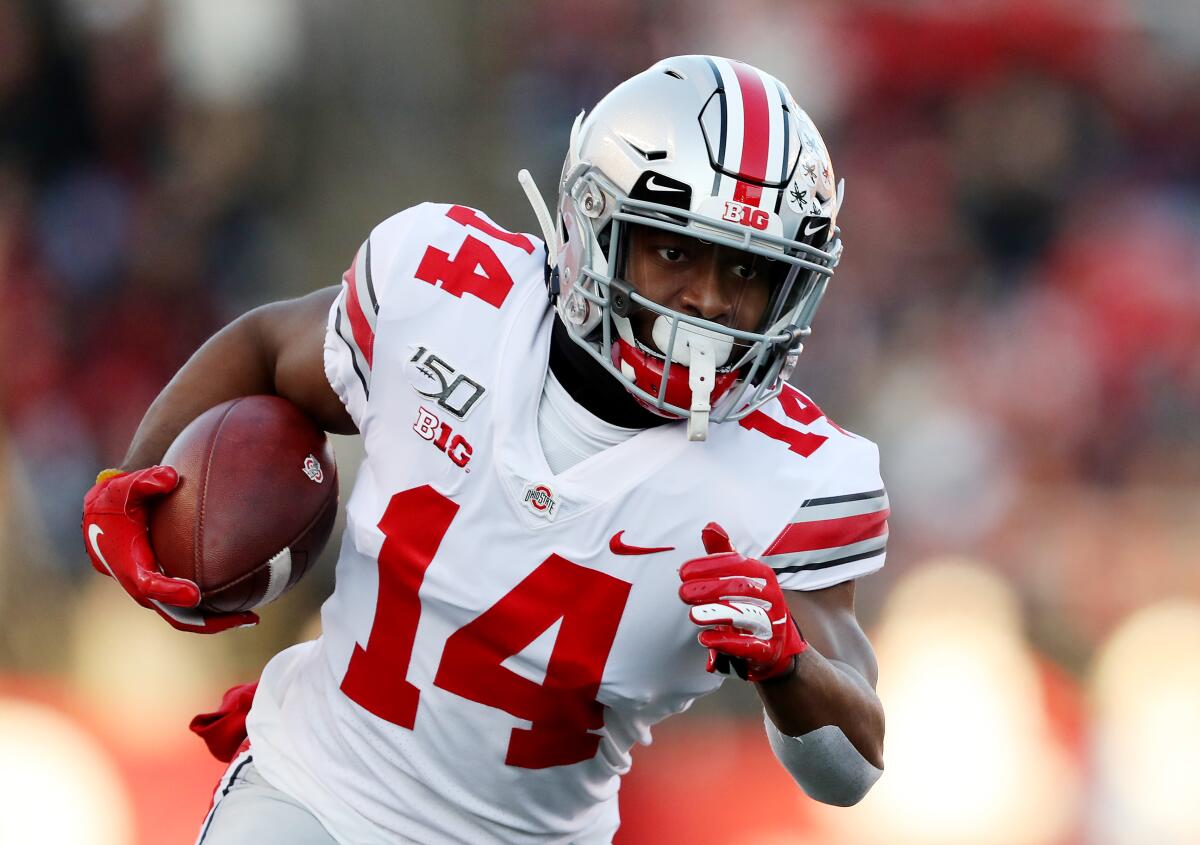
Notable: Hill had a school-record 201 career receptions at Ohio State and finished sixth with 2,332 receiving yards.
Last season: He caught a team-high 57 passes for 636 yards and 10 touchdowns. Hill also returned five punts to give him 45 in his career at Ohio State.
Why Chargers drafted him: Hill provides depth at a position that is lacking. He brings experience and savvy as someone who earned his degree (in communications) before his final season.
More to Read
Go beyond the scoreboard
Get the latest on L.A.'s teams in the daily Sports Report newsletter.
You may occasionally receive promotional content from the Los Angeles Times.

